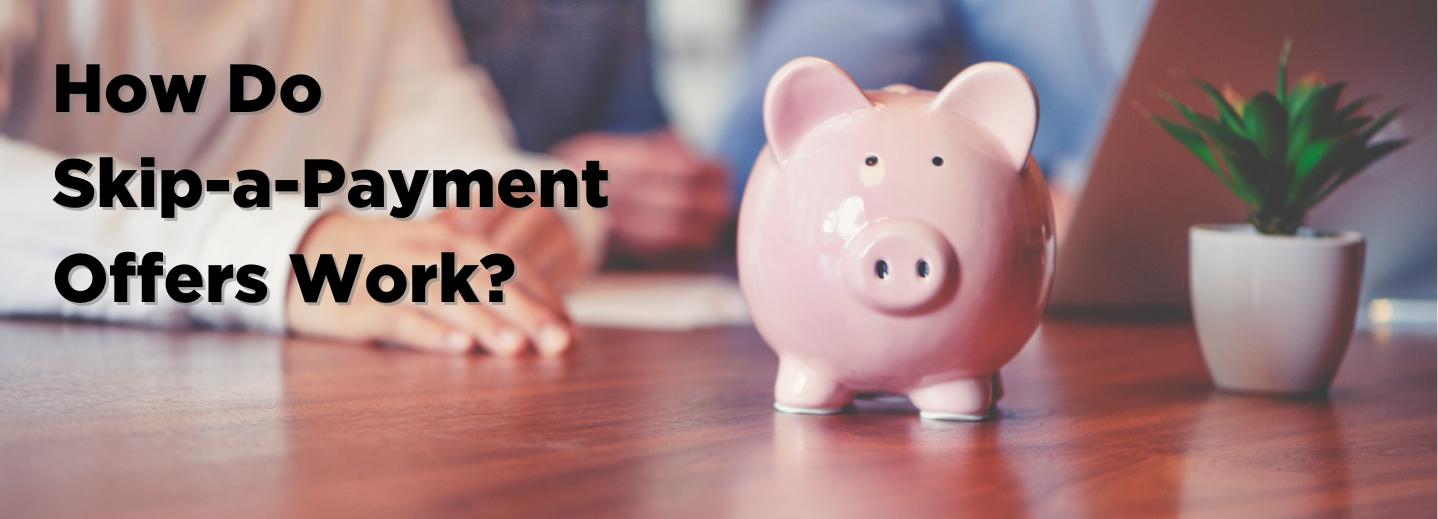How Do Skip-a-Payment Offers Work?

Everyone needs access to extra cash from time to time. Whether it’s an unforeseen medical bill, a sudden car repair, or for additional spending money during your vacation, having extra cash on hand is always welcome. If you’re looking for a practical solution, consider skipping a loan payment.
You may have come across skip-a-payment offers before, or you may have utilized them in the past. However, it’s crucial to understand how they operate and be aware of potential drawbacks. In this article, we’ll dive deeper into how skipping loan payments work and the impact it can have on your loan and wallet.
What is a Skip-a-Payment Promotion?
A skip-a-payment offer is exactly as it sounds – the ability to skip one of your monthly loan payments. These promotions are commonly found during the summer and winter holidays. If you’re facing a financial setback, your lender might offer to delay one of your loan payments to help you get back on financial track.
How It Works:
Each lender will have their own process and rules for skipping loan payments. However, these offers typically follow a similar format.
1. Choose the Loan(s) to Skip
Lenders will often restrict which loans qualify for skip-a-payment promotions. Due to the type of loan and lending rules, you typically cannot skip home loans, such as mortgages or home equity loans. Likewise, credit card payments are generally handled differently than traditional loan payments and are often restricted.
The most common loans to skip include auto loans and personal (signature) loans.
2. Pay Any Necessary Fees or Charges
Skip-a-payment promotions often charge a nominal fee for each loan you skip, for example, $50. These charges are used to cover the cost of restructuring your loan payment. This fee does not go towards the principal on your loan or any accrued interest.
3. Skip Your Loan Payment
It’s important to note that when you delay a loan payment, the current monthly payment moves to the end of your loan. This will generally extend your loan’s final payment date by one month.
For example, assume your loan is scheduled to be paid off in March 2026. If you skip a payment, your new loan payoff date will be in April 2026.
Why Would You Skip a Loan Payment?
There are a variety of reasons you might skip a loan payment. Most commonly, it’s to give yourself access to extra cash. Imagine your monthly car payment is $400. If you pay $50 to skip a payment, that’s $350 you can use in another manner.
The impact is even more significant if you have multiple loans. If you and your spouse each have an auto loan, and the payments are $400 and $550 – that’s $950 back in your wallet today (minus any skip-a-payment costs).
These promotions can be ideal in the following circumstances:
- Vacation Funds: Boost your vacation budget by skipping your loan payments vs. relying on high-interest credit cards.
- Holiday Shopping: Between gifts, travel, and entertainment, the winter holidays can get pricey. Skip-a-payment promotions provide a low-cost option to extend your budget.
- Financial Setbacks: Unexpected expenses always pop up. Whether it’s an unplanned medical bill or car repair, skipping a loan payment can help you cover the costs without taking on new debt.
- Credit Card Debt: High-interest credit cards can cause significant financial challenges. Paying a nominal fee to skip your car payment can help free up cash to pay down high-interest debt that eats away at your monthly budget.
- Balancing Your Budget: Following a budget can be challenging at times. Skipping your loan payment(s) could help you balance your budget and get back on track with your financial goals.
Are There Any Drawbacks?
While many financial perks come with skip-a-payment promotions, it is important to know how they work.
- Interest Accrues: When you skip a loan, the interest continues to accrue during that period. This action might cause your last loan payment to be slightly higher, or your loan payoff date could be extended to make up the interest charge. Because auto and personal loans are the most common skipped loans, these charges are usually minimal.
- Extended Loan Term: Again, when you skip a loan payment, the delayed payment is added to the end of your loan – extending it by one month. This aspect usually is not a big deal unless you begin to use skip-a-payment promotions regularly.
Most lenders will restrict how often you can skip a loan payment to prevent it from negatively affecting your loan. Typically, you can skip a payment once every six to twelve months. However, assume you have a 6-year (72-month) auto loan, and you skip a payment every six months. That would equate to twelve skipped payments – adding a year to your loan. This strategy can cause you to generate negative equity on your loan. Most lenders will prevent this scenario by restricting additional skips after a certain number.
Takeaway
Skip-a-payment promotions are a great way to put extra cash in your pocket or get back on financial track after a setback. However, like all financial tools and incentives, you must use them responsibly. If you plan to skip a loan payment, ensure you understand your new payoff date and any costs associated with the skip before signing up.
CAMPUS Can Help!
If you’re interested in learning more about skipping a loan payment or are facing a financial setback, please contact us at your earliest convenience. You can stop by any of our convenient service center locations or call 800-367-6440 to speak directly with a CAMPUS Representative. If you are enrolled in CAMPUS Online & Mobile Banking you can complete your form online.
By CAMPUS USA at 25 Jul 2023, 15:36 PM